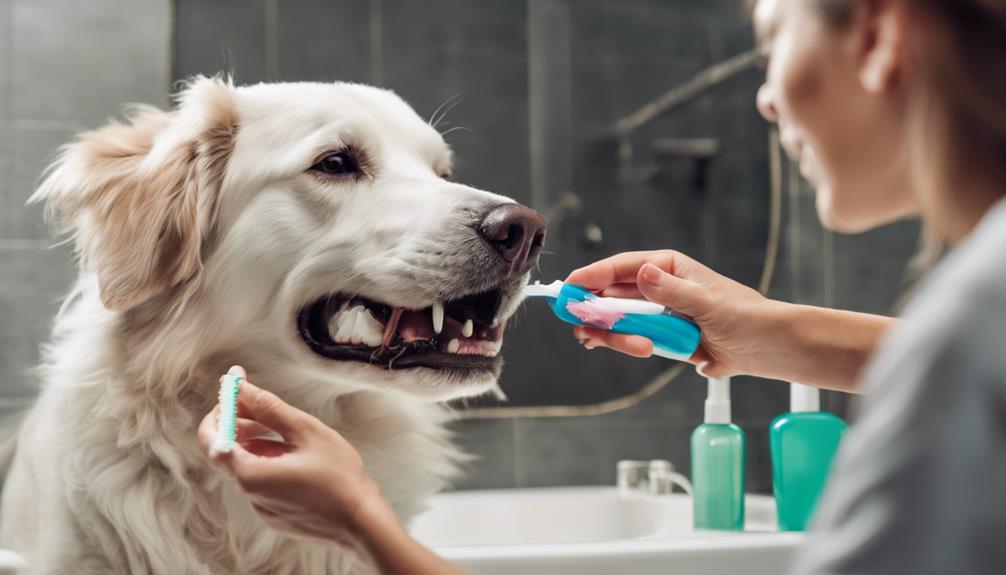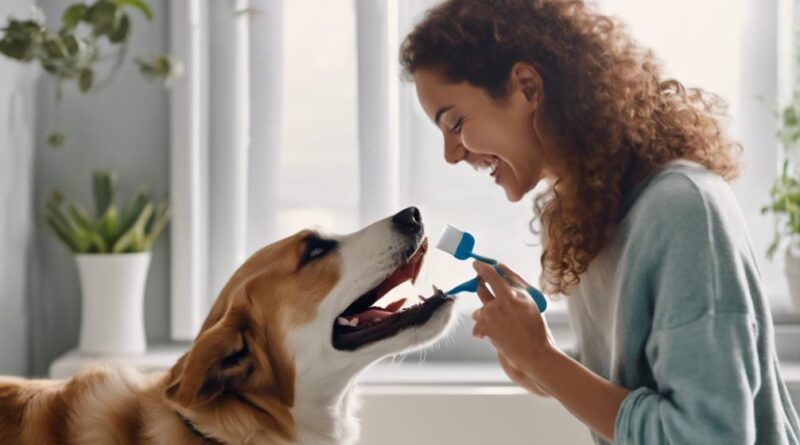How-To Guide: Essential Tips for Dog Dental Care
Ensuring your furry friend's dental health is crucial for their overall well-being. From brushing techniques to choosing the right tools, there are essential tips that every dog owner should know.
But have you ever wondered about the significance of dental chews and treats in your dog's oral hygiene routine? Understanding their role in maintaining those pearly whites may surprise you.
Importance of Dog Dental Care
Maintaining proper dental care for your dog is crucial for their overall health and well-being. Just like humans, dogs require regular dental hygiene to prevent dental problems such as plaque buildup, gum disease, and tooth decay. Prevention methods are key in ensuring your dog's dental health.
Here are some dental hygiene tips to keep your furry friend's teeth in top shape.
Firstly, brushing your dog's teeth regularly is essential. Use a dog-specific toothbrush and toothpaste to gently scrub their teeth, ensuring you reach all areas of the mouth. Additionally, giving your dog dental chews and toys designed to promote dental health can help reduce plaque and tartar buildup. These chews can also help freshen your dog's breath.
Moreover, scheduling routine dental check-ups with your veterinarian is important. They can perform professional cleanings and address any potential dental issues early on. By following these prevention methods and dental hygiene tips, you can help ensure your dog maintains a healthy and happy smile.
Signs of Dental Problems in Dogs
To ensure your dog's dental health stays optimal, it's important to be aware of the signs indicating potential dental problems. Keep an eye out for symptoms such as bad breath, inflamed gums, tartar buildup, loose or missing teeth, difficulty chewing, drooling, pawing at the mouth, and reluctance to eat. If you notice any of these signs, it could indicate that your dog is experiencing dental issues that require attention.
Prevention tips are crucial in maintaining good oral health for your furry friend. Regularly brushing your dog's teeth, providing dental chews or toys, and feeding them a balanced diet can help prevent dental problems from arising. Additionally, scheduling annual dental check-ups with your veterinarian is essential for early detection and treatment of any issues.
When it comes to treatment options for dental problems in dogs, your veterinarian may recommend professional dental cleanings, tooth extractions, or other procedures to address any underlying issues. It's important to follow your vet's advice and maintain good dental care practices at home to ensure your dog's teeth and gums stay healthy.
Best Practices for Brushing
For effective dog dental care, start by establishing a regular brushing routine. Proper technique and consistency are key to maintaining your furry friend's oral health.
Here are some best practices for brushing your dog's teeth:
- Gentle Approach: Use a dog-specific toothbrush and toothpaste to prevent irritation and ensure effective cleaning.
- Start Slow: Introduce brushing gradually to allow your dog to get used to the sensation and taste of the toothpaste.
- Focus on the Back Teeth: Pay extra attention to the molars and premolars, as these are common areas for plaque buildup.
- Frequency Reminders: Aim to brush your dog's teeth at least 2-3 times a week to keep their mouth fresh and healthy.
Choosing the Right Toothbrush
When selecting a toothbrush for your dog, consider the size and bristle texture to ensure effective cleaning and comfort. The toothbrush size should match the size of your dog's mouth. For smaller breeds, a toothbrush with a smaller head will be more manageable and reach all areas of the mouth easily. Conversely, larger breeds may require a toothbrush with a bigger head to efficiently clean their teeth.
In terms of bristle type, choose a toothbrush with soft bristles specially designed for dogs. Hard bristles can be harsh on your dog's gums and may cause discomfort. Soft bristles are gentle on the gums while effectively removing plaque and debris from the teeth. Additionally, look for toothbrushes with angled bristles as they can help reach those hard-to-access areas in your dog's mouth.
Dental Chews and Treats
Considering your dog's oral health, incorporating dental chews and treats into their routine can be beneficial for maintaining clean teeth and fresh breath. These products are specially designed to help with your dog's dental care routine. Here are some key benefits of using dental chews and treats:
- Promote Healthy Gums: Dental chews can help reduce plaque and tartar buildup, which in turn promotes healthier gums for your furry friend.
- Freshen Breath: Chews and treats often have ingredients that help combat bad breath, keeping your dog's mouth smelling fresh.
- Provide Mental Stimulation: Chewing on dental treats can provide mental stimulation and relieve boredom for your dog.
- Alternative to Chew Toys: Dental chews serve a dual purpose by satisfying your dog's urge to chew while also promoting dental health, making them a great alternative to regular chew toys.
Incorporating these dental chews and treats into your dog's routine can contribute to their overall dental health and well-being.
Regular Veterinary Check-ups
To ensure your dog maintains optimal oral health, scheduling regular veterinary check-ups is essential. These check-ups are crucial for preventative care and maintaining good oral hygiene in your furry friend. During these visits, the veterinarian will examine your dog's teeth, gums, and mouth to check for any signs of dental issues such as plaque buildup, gum disease, or infections. They can also provide professional cleanings to remove tartar and prevent potential oral health problems.
Regular veterinary check-ups allow for early detection of any dental issues, which can help prevent them from progressing into more serious conditions. Your veterinarian may also offer advice on at-home dental care practices to further support your dog's oral health between visits. By staying proactive with these check-ups, you can ensure that your dog's teeth and gums remain healthy, promoting overall well-being and quality of life for your beloved pet.
Managing Bad Breath

For effective management of bad breath in your dog, implementing proper dental care practices is crucial. Bad breath can be a sign of underlying dental issues that need attention. Here are some tips to help you manage your dog's bad breath effectively:
- Diet: Providing your dog with high-quality food that promotes dental health can help reduce bad breath. Look for options that support oral hygiene.
- Water additives: Adding dental water additives to your dog's water bowl can help fight bacteria in their mouth, reducing bad breath over time.
- Natural remedies: Some natural remedies like dental chews or toys designed to promote dental health can aid in freshening your dog's breath.
- Professional cleanings: Regular visits to the veterinarian for professional dental cleanings are essential for maintaining your dog's oral health and keeping bad breath at bay.
Potential Dental Health Issues
Identifying potential dental health issues early is crucial for maintaining your dog's overall oral well-being. Regularly inspect your dog's mouth for signs of problems such as bad breath, swollen gums, discolored teeth, or difficulty chewing. These could indicate underlying issues like gum disease, tooth decay, or oral infections.
If left untreated, these problems can lead to pain, tooth loss, and even more severe health issues. To prevent such issues, establish a dental care routine that includes daily brushing with dog-specific toothpaste, providing dental chews or toys for chewing, and scheduling regular professional cleanings with your veterinarian.
Additionally, consider using dental hygiene products like water additives or dental wipes to complement your dog's oral care regimen. By being proactive and implementing preventive strategies, you can help ensure that your dog maintains strong and healthy teeth and gums throughout their life.
Frequently Asked Questions
Can I Use Human Toothpaste for Brushing My Dog's Teeth?
You should avoid using human toothpaste for brushing your dog's teeth. It's not safe for them because it can contain ingredients that are harmful if ingested.
There are alternative options specifically formulated for dogs that are safe to use. These dog toothpaste products come in flavors that dogs enjoy, making the brushing experience more pleasant for both you and your furry friend.
Prioritize your dog's dental health by using the right toothpaste for them.
How Often Should I Replace My Dog's Toothbrush?
You should replace your dog's toothbrush every 3 to 4 months, depending on its durability. Regular use can wear down the bristles, making the brush less effective at cleaning your dog's teeth.
To maintain good oral hygiene, consider swapping out the toothbrush after a few months or if you notice signs of wear and tear. This simple practice ensures your dog receives the best dental care possible.
Are There Any Natural Remedies for Dog Dental Care?
When it comes to natural remedies for dog dental care, there are a few options to consider. Herbal remedies and dental chews can help maintain your dog's oral health. Homemade toothpaste using ingredients like coconut oil can also be beneficial.
These alternatives can complement regular brushing and professional cleanings to keep your furry friend's teeth and gums in good shape. Remember, always consult with your vet before introducing new products into your dog's dental care routine.
Is Anesthesia Necessary for Professional Dental Cleanings for Dogs?
For professional dental cleanings for dogs, the anesthesia debate is ongoing. While some vets believe it's necessary for a thorough cleaning, others advocate for alternative options like non-anesthetic dental cleanings.
Discuss with your vet the best approach for your dog based on their individual dental health needs. Anesthesia can be safer for procedures requiring deep cleaning and extractions, but explore all options to make an informed decision.
Can Certain Dog Breeds Be More Prone to Dental Issues Than Others?
Some dog breeds are more prone to dental issues due to genetic predisposition. Breed-specific characteristics can affect oral health, leading to a higher likelihood of dental problems.
It's important to be aware of these tendencies in your dog's breed and take proactive steps to maintain their dental hygiene. Regular dental check-ups and professional cleanings can help address and prevent potential issues that may arise.
Conclusion
Keep your furry friend's teeth and gums healthy with regular dental care. By brushing their teeth regularly, providing dental chews and treats, and scheduling regular veterinary check-ups, you can prevent dental issues and keep their breath fresh.
Pay attention to any signs of dental problems and address them promptly to ensure your dog's overall health and well-being. Your pup will thank you with a happy, healthy smile for years to come.
